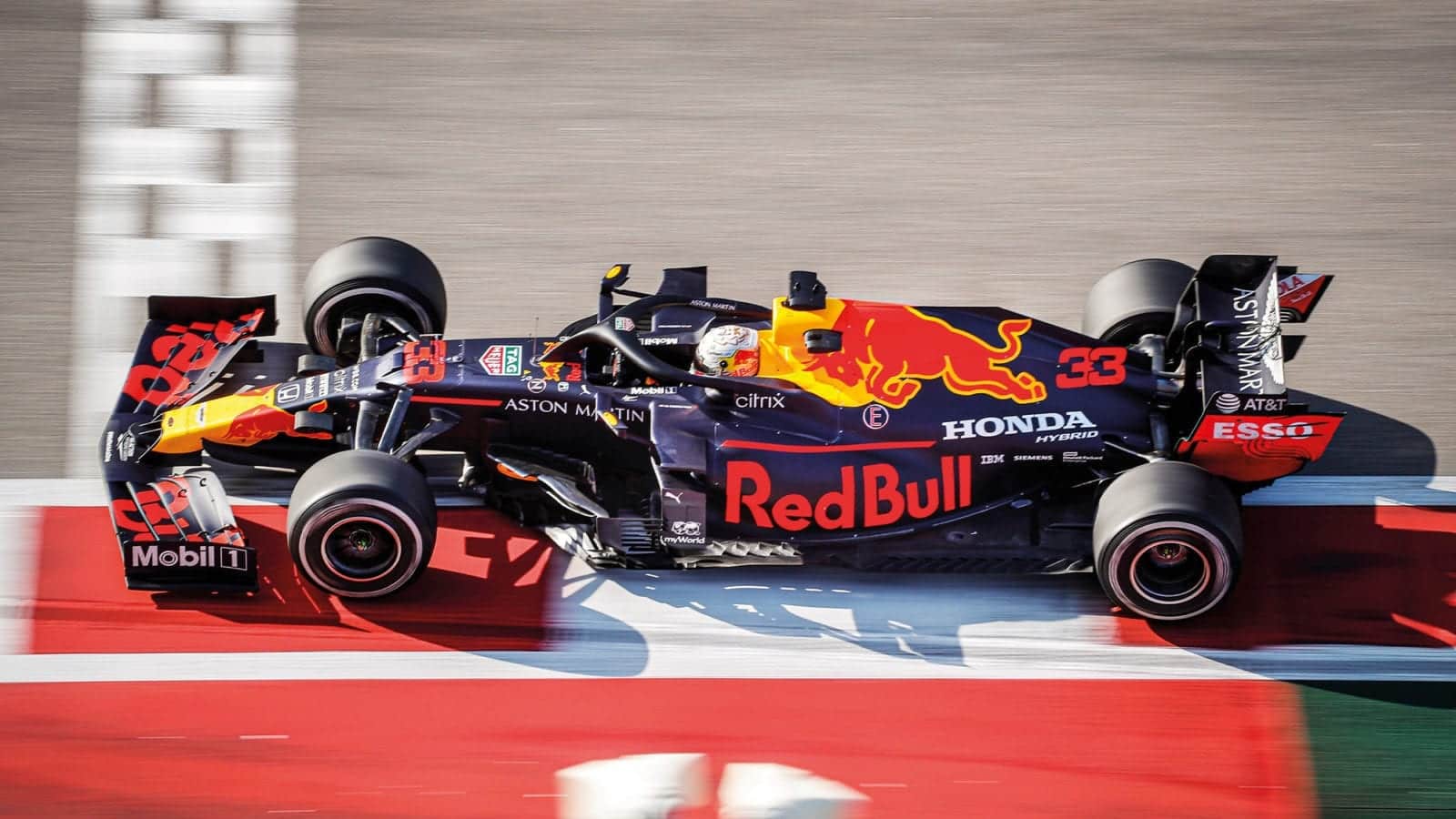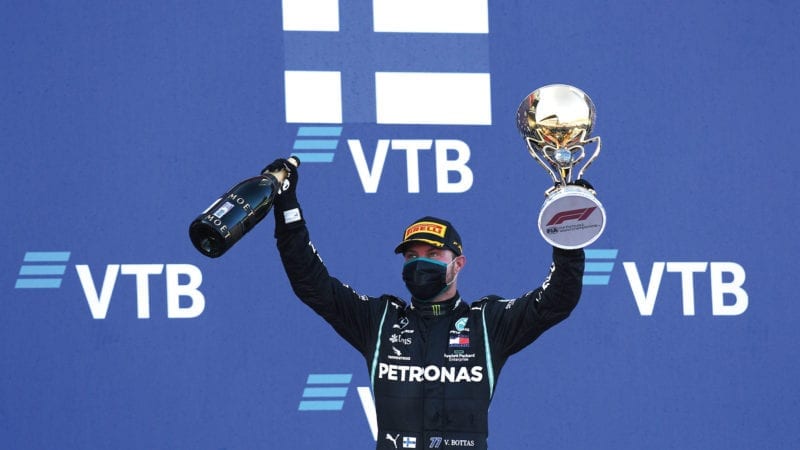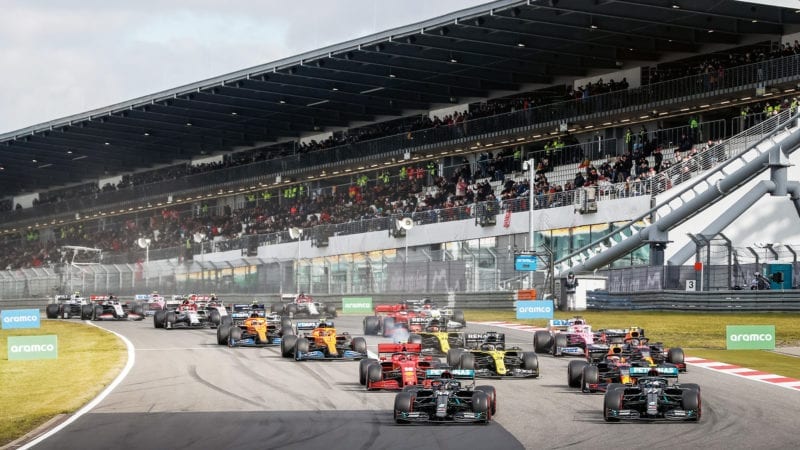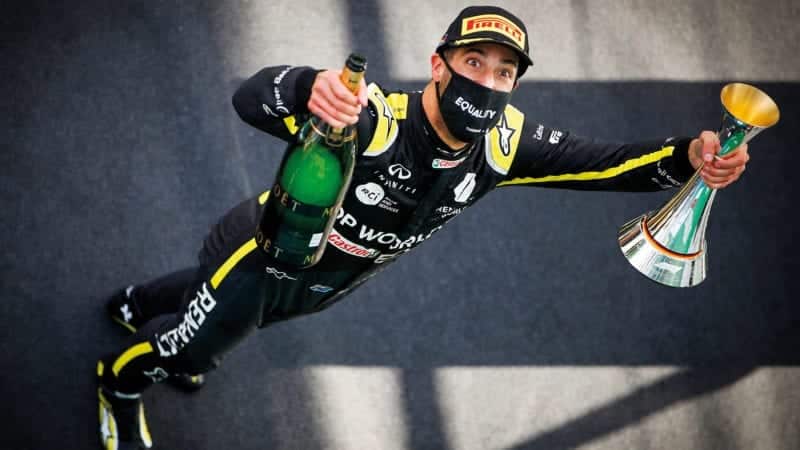Honda announces F1 exit, as Mercedes wins Russian & Eifel GPs
The explosive news of Honda’s exit from Formula 1 at the end of 2021 came against a backdrop of racing drama in Russia and Germany. Mark Hughes reports

Despite some huge progress, Honda will be pulling out of F1 after next year. But will Mugen pick up the slack?
In between the Russian and Eifel grands prix, Honda announced it would be pulling out of F1 at the end of next year, ostensibly leaving the Red Bull group looking for a new engine supplier just a year after switching the senior team from Renault power.
Honda insisted that it was nothing to do with budgets or profits, that it was about its gearing up to be providing carbon-neutral transport by 2050 and needing to redeploy its F1 brains and resources to that task. Inevitably there was the question of whether it would have made the same decision if it had been winning world championships rather than stealing the occasional victory from the dominant Mercedes. Pierre Gasly’s recent Italian Grand Prix victory for the Red Bull junior team AlphaTauri made Honda the only hybrid supplier to have won races with two different teams. But that was neither enough nor timely.
There’s probably a certain irony that the boss of the Mercedes team that has so completely dominated the hybrid formula, Toto Wolff, believes Honda’s competitive position must have played a significant role in the decision.
“It’s a shame that Honda has decided against Formula 1,” he commented at the Nürburgring, the venue for the Eifel Grand Prix, the first F1 race there in seven years. “I believe it’s always a ratio of risk versus return. At the end of the day each of us needs to provide an ROI – Return on Investment – that makes sense. So whatever capital you deploy for the investment in Formula 1 needs to guarantee or needs to return sensible marketing value, and if that is not the case I can understand that somebody says ‘we’ve tried it and it didn’t function’.
“Unfortunately this sport is about, in my belief, not only investment. All the investment doesn’t buy you success because it’s a long-term commitment that you need to provide. We have seen it with Mercedes: we had a couple of really painful years and managed to turn it around. In the past, OEMs came and left, many of them, including Honda, BMW, Toyota and many more, and that’s unfortunate. Formula 1 needs a stable commitment from all of us and needs to have the buy-in from the board, saying ‘OK, we launch ourselves into this, it might be difficult, we’re setting our expectations low but at a certain time we will turn this around.’ At the end, we need to accept it. It’s certainly not great for us to lose an engine manufacturer.”
“The irony is we were pushed to new levels by our rivals last year”
Would Mercedes be willing to supply Red Bull? “No,” answered Wolff immediately… Last year, Red Bull-Honda were gaining on Mercedes towards the end. They shared the last four pole positions of the season two apiece, and the GPS analysis in Abu Dhabi for the last round of the season suggested there was less than 10bhp between them. Honda had come so far, so fast since their desultory three seasons with McLaren and had already made the breakthrough of victory with Max Verstappen. Ironically, this breakthrough in form coincided with the strong rumours that there was a faction within the parent company that wished for Honda to be out of F1.
But it wasn’t Honda that was bothering Mercedes back then; it was Ferrari and how it might have been deriving its power advantage over everyone. That has since been corrected by FIA investigation and subsequent technical directives, but not before it had spurred Mercedes HPP into a remarkable effort during the winter with its power unit.
“The irony of the story is that we were pushed by some of our competitors to absolutely new levels,” said Wolff earlier this year in reference to whatever Ferrari was doing last year. “It brought us to almost burnout last year to develop and innovate in a way to be competitive on track. And here we go. I think we made a substantial jump in performance from 2019 to 2020 because we needed to last year, and that is a bit ironic for me.”
That response to a Ferrari rules interpretation that has since been outlawed has put Mercedes significantly ahead of the pack in the horsepower race this year, leaving Honda somewhat outgunned. Verstappen won the 70th Anniversary Grand Prix at Silverstone, but only because the Mercedes were in terrible tyre trouble; it wasn’t won on pace. Likewise Gasly’s Monza victory, highly meritorious though it was, had at its foundation in the timing of a safety car. In other words, the results paint a flattering picture of where Red Bull-Honda have stacked up this year. The Honda is probably only the third-most powerful engine and the RB16 is a tricky car, with an inherent balance problem.
Max Verstappen, however, continues to be a touchpoint of brilliance and can be relied upon to drag every last scrap of performance from the car, even at its most difficult. Such was the case in Sochi where the car’s lack of rear stability was quite acute but he managed to improvise a way around it to split the Mercs, putting the Red Bull on the front row. It was 0.5sec adrift of pole sitter Lewis Hamilton’s lap and Valtteri Bottas, third fastest, may not have been trying too hard to take pole, given how vulnerable that makes you to being slipstreamed at the start of the race. But it was still way better than the car merited.

The ups and downs of F1: Bottas won in Russia, but retired in Germany
The Russian race was indeed very much about the first corner – but not as much as it was about the two 5sec penalties given to Hamilton for doing practice starts outside of the allocated area and the disallowing of his medium-tyred time in Q2 for track limits, which led to him starting on the soft tyre. Both the penalty and the tyre choice would severely compromise him after he led the opening stint. Bottas and Verstappen had gone through Q2 on the mediums which had double the range here of the soft. As Bottas had patiently just followed Hamilton, knowing he had the strategy advantage over him, Verstappen was able to stay with them. But as soon as Hamilton pitted out of the way and Bottas stepped up the pace, the Red Bull had no answer. “I just couldn’t push on the corner entries,” related Verstappen, “because there was no support from the rear.” Bottas pulled out 10sec on him in nine laps. Game essentially over. When both switched to the hard tyre for the second half, the Red Bull was much better balanced. But not to the extent that Verstappen could do anything about the gap Bottas had opened up earlier. Second place was another flattering result.
Hamilton’s problems in Sochi had denied him the chance of equalling Michael Schumacher’s all-time victory tally of 91. Fittingly, that marker would be ticked off at the Nürburgring. But Red Bull had got something for this race – a very subtle aerodynamic upgrade, believed to reside beneath the nose, coupled together with aerodynamically reconfigured rear brake ducts that seemed to have tamed that rear end. Verstappen was vying with the Mercs for pole and although he ultimately lined up only third, it was the nearest to pole the car had been all season – and was achieved with a balance that Verstappen judged too understeery! The Friday practice sessions were cancelled – it was too foggy for the medical helicopter to fly – otherwise they might have been able to tune that out.

Bottas got the jump on Hamilton early on at the Nürburgring, but a hybrid issue put him out, leaving Hamilton clear to net that record-equalling 91st victory
Although the understeer cost him a stronger shot at pole (Verstappen was fastest in sector one, second-fastest in sector two and only third in the final sector as the front tyres steadily deteriorated through the lap), he was actually quite pleased about it. “It means we seem to have tamed the rear,” he beamed.
Just like in Sochi, he closely tailed the two Mercedes in the first stint (this time with Bottas leading Hamilton) and left the rest of the field well behind. Bottas locked up, had to pit early, then retired with a broken MGU-H. Hamilton and Verstappen were left out on their own, almost a lap ahead before a late safety car. The Red Bull still wasn’t quite a Mercedes match, and couldn’t prevent Hamilton taking that historic Schumacher-equalling record – but Verstappen wound it up to take fastest lap on the very last tour. A little further back, Pierre Gasly in his AlphaTauri-Honda passed Charles Leclerc’s Ferrari to take sixth.
Good, but maybe insufficient ROI.

Daniel Ricciardo scored Renault’s first podium since its works team return in the Eifel GP

